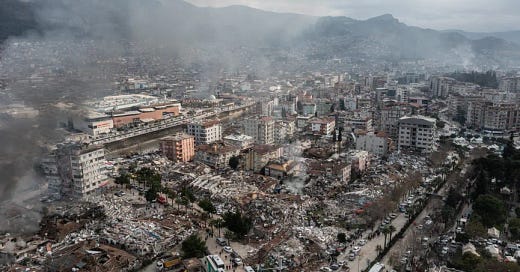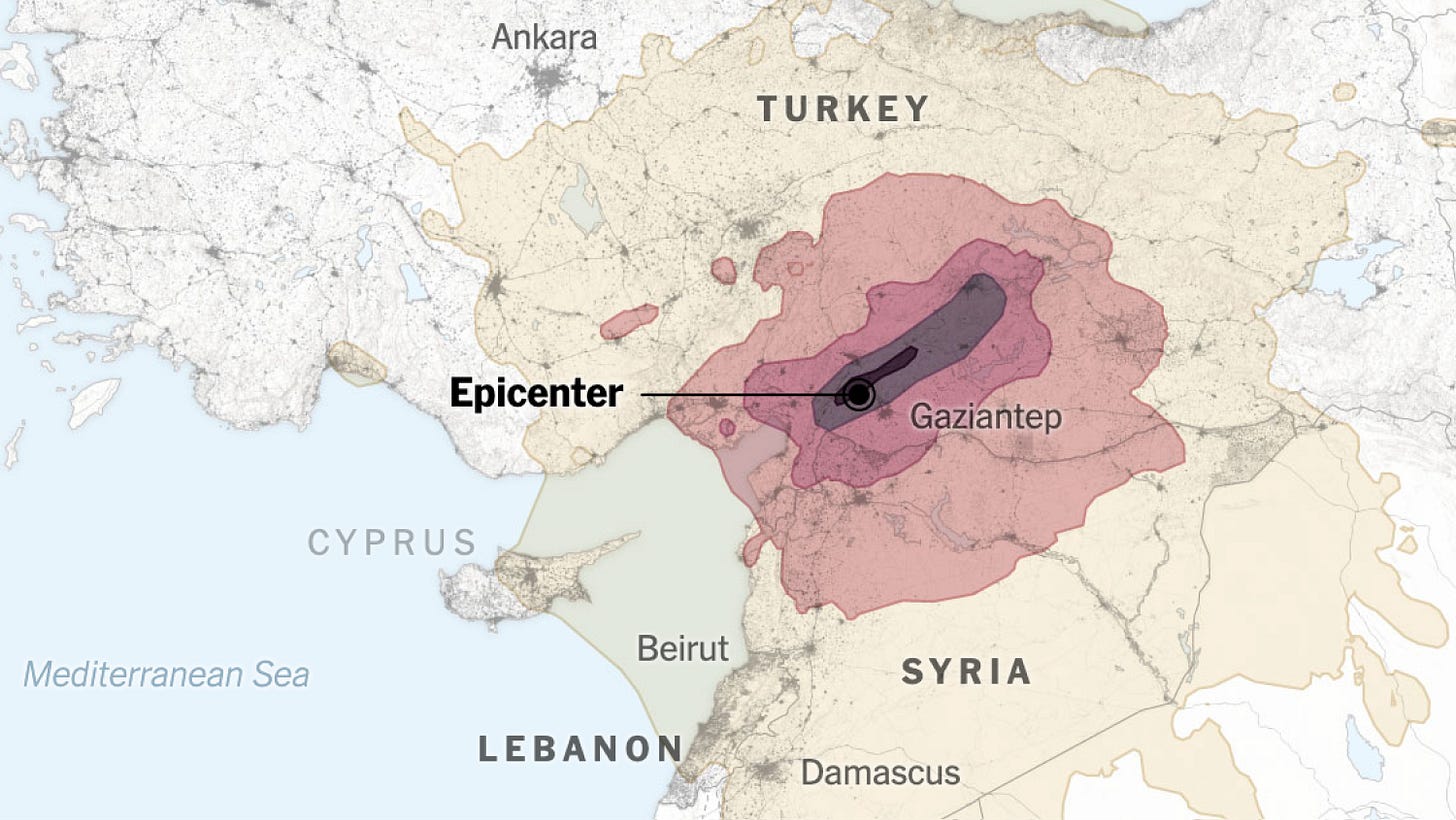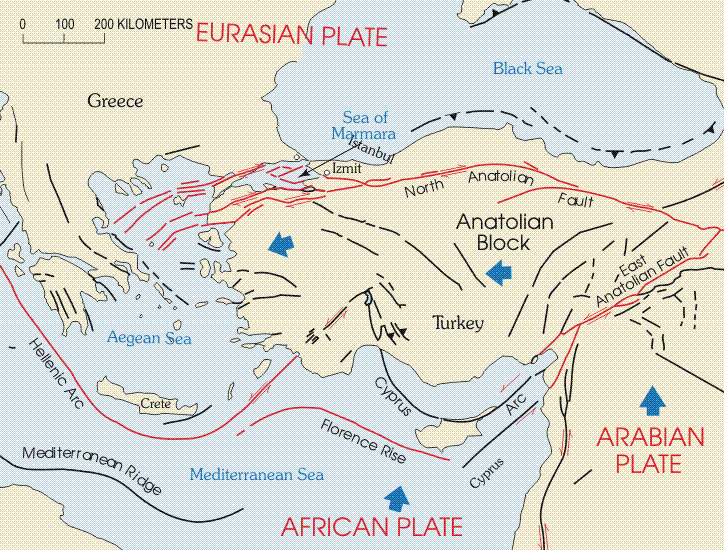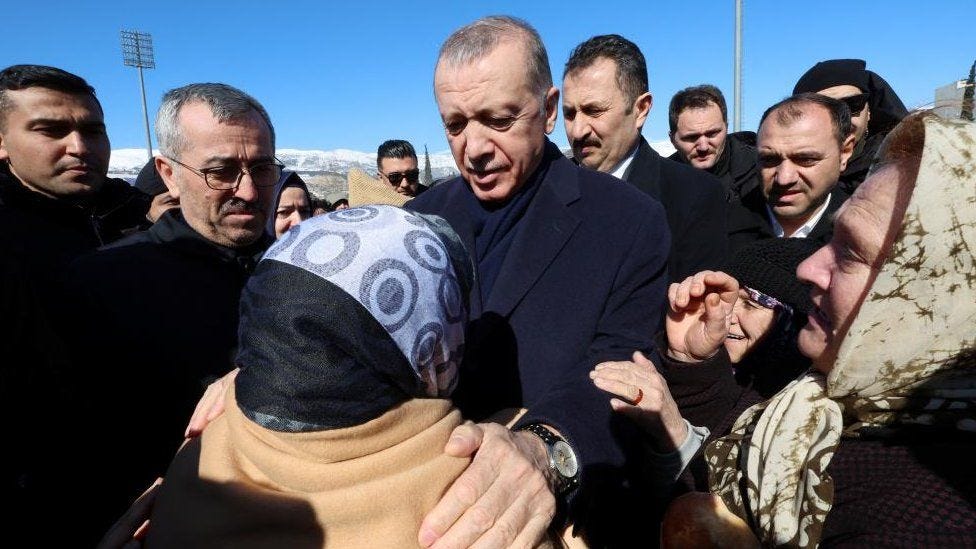Welcome to Inshallah, your weekly source for the latest and most newsworthy news from the Middle East. I'm Dario Sabaghi, and I've got my eye on the most impactful stories of the week just for you.
Join me on this journey of discovery and stay ahead of the curve with the most insightful news from the region. Best of all, subscribing to Inshallah is completely free.
What happened?
On February 6, 2023, a devastating and fatal earthquake hit central and southern Turkey and western Syria.
The earthquake occurred about 34 km west of Gaziantep at 4:7 a.m. (1:17 a.m. UTC) and caused widespread destruction and tens of thousands of casualties in the area.
With a magnitude of at least 7.8, the earthquake is considered one of the strongest to ever hit Turkey and the deadliest since the 1999 İzmit earthquake.
It is also one of the strongest earthquakes recorded in the Levant region and caused significant damage in neighboring countries like Lebanon.
The earthquake was followed by several aftershocks, and the death toll has risen to 16,000 as of today, Thursday, February 9.
The rescue efforts have been hindered by a winter storm that brought snow and subzero temperatures to the affected areas, putting survivors, especially those trapped under rubble, at high risk of hypothermia.
How big was the Turkey-Syria earthquake?
Turkey is located on the Anatolian plate between the North Anatolian Fault and the East Anatolian Fault. The plate-carrying Arabia, including Syria, is colliding with the southern rim of Eurasia and squeezing Turkey towards the west.
Therefore, the geological location makes Turkey one of the world's most active earthquake zones.
The average number of earthquakes with a magnitude of 7.0 or greater in a year is less than 20, which makes Monday's quake a significant occurrence.
Additionally, the earthquake in Turkey and Syria released 250 times more energy than the 6.2 magnitude quake that struck central Italy in 2016 and resulted in the deaths of approximately 300 people.
Why was the earthquake in Turkey and Syria so deadly?
Many earthquake deaths result from falling bricks and masonry, and many Turkish earthquake victims lived in structures that were highly likely to be damaged by shaking, including buildings with unreinforced brick masonry and low-rise concrete frames.
After the 1999 7.4-magnitude earthquake that killed over 17,000 and left over 250,000 homeless in Izmit, the Turkish government introduced new building codes and compulsory earthquake insurance.
However, many buildings affected by the recent earthquake were built before 2000.
The situation is worse in Syria, where conflict has made enforcing building standards difficult. Some war-damaged buildings in Syria have been rebuilt with low-quality materials, which may have contributed to their collapse.
How did the world react to the earthquake in Turkey and Syria?
Numerous countries around the world, including the United States, the EU, Ukraine, Russia, and China, have pledged aid and sent search and rescue teams to Turkey in the aftermath of a recent earthquake. The UN, NATO allies, World Health Organization, International Federation of Red Cross and Red Crescent Societies, and various other nations have voiced their support and are providing assistance in various forms, such as search and rescue teams, medical teams, and emergency aid.
What makes it difficult to assist those affected by earthquakes in Syria?
Despite the smooth progress in providing support to Turkey, delivering aid to Syria presents several challenges.
Getting aid to Syria is deeply complicated by its 2011 civil war that has left the country divided into roughly three parts: the government-held areas, a part controlled by the U.S.-backed Kurdish forces, and an opposition-held pocket in the northwest where nearly two-thirds of its 4.5 million inhabitants have been displaced from elsewhere, and a humanitarian crisis was already underway before the earthquake.
Infrastructure damage in southern Turkey is hindering aid delivery to the north of Syria.
The international community is reluctant to send aid directly through the government of Bashar Assad in Damascus, as he is considered a pariah by the US and European countries, which have imposed sanctions.
The UN's mandate only allows aid to enter through the Bab al-Hawa crossing, and international teams may be reluctant to enter earthquake-affected areas controlled by the terrorist group Hayat Tahrir al-Sham (HTS).
The UN's ability to deliver aid is also complicated by the Syrian government's failure to recognize non-governmental organizations working in northwestern Syria.
Meanwhile, the Syrian Arab Red Crescent head has called for the EU to lift sanctions, but the US and UK have resisted the request, saying the sanctions were imposed due to human rights violations.
What was Turkey's response to the earthquake?
Turkey declared a state of emergency for ten provinces for three months, starting from Tuesday, February 7.
President Recep Tayyip Erdogan has defended his government's actions following the devastating earthquake, stating that it was impossible to be fully prepared for such a catastrophic event.
The earthquake has overshadowed the run-up to the May elections, already set to be the toughest for Erdogan in his 20 years in power.
The opposition parties and some residents in the affected areas have criticized the slow or inadequate response from the authorities.
Any perception of the government's failure to properly address the disaster or enforce adequate building codes could hurt Erdogan's election prospects.
However, analysts believe that Erdogan, who has tackled natural disasters since coming to power in 2003, could rally national support around the crisis response and strengthen his position.
Reconstruction costs will likely run into billions of dollars and strain the already inflation-hit economy.
The disaster is expected to curb growth and reset Turkey's economy and politics.
The response of Erdogan's government could sway crucial middle-ground voters in a close election, although it is unlikely to change the loyalties of committed voters.
How to help victims affected by the Turkey-Syria earthquake?
Several NGO watchdogs advise that potential donors take several steps when choosing an organization to donate to, such as researching the organization to ensure its reputation and determine its effectiveness in responding to the crisis.
You can find a list of international organizations that accept donations to aid in response to the Turkey-Syria earthquake here and here.
Thanks for tuning in to this week's edition of Inshallah, your go-to source for Middle Eastern news. Don't forget to share and subscribe to stay informed, all for free!
About me
My name is Dario Sabaghi, and I am a freelance journalist interested in international news focusing on the MENA region.
Check out my work at dariosabaghi.com.
You can follow me on Twitter: @DarioSabaghi
Did I miss any important news from the Middle East? DM me on Twitter.
Cover photo: USA TODAY










